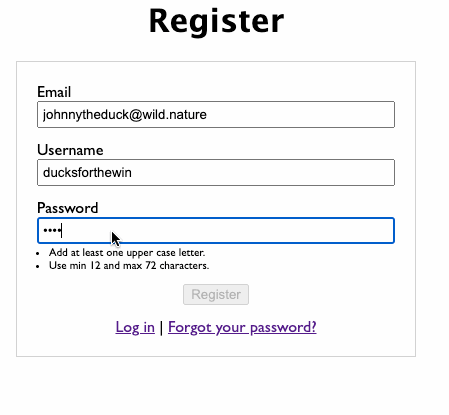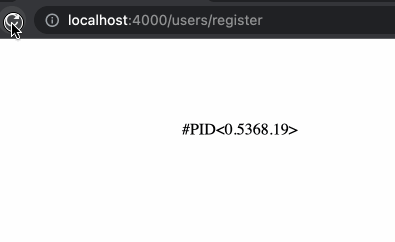The idea is this. LiveView form for registering users. Because it is a user register, and I need to set cookies, I must use a regular controller, not a LiveView, when submitting the form. However, I use a phx-change on the form to check for validation errors as the user is filling out the form.
When the user submits an invalid form, the controller handles it. Plug.Conn requires a response being sent back to the client, but I don’t want the page to reload, because it isn’t necessary. The current page just needs to be send some info about the errors. So I don’t render() or redirect() inside the controller in case of validation errors and I try to send a message to the LiveView process.
I have made some adjustments to the code. I was sending the pid as a string as part of the form data before. The controller then reconstructed a pid from that string. That was just a temporary solution. Now the LiveView registers self() under a name and the controller uses that name to get the right pid-address to send the message to.
Message to LiveView still does not get handled by handle_info.
Here the current code with returns of IO.inspect in comments. So this is the actual code, so names are different from original post.
# LiveView
defmodule TodayForumWeb.RegistrationLive do
use TodayForumWeb, :live_view
import Ecto.Changeset
alias TodayForumWeb.Router.Helpers, as: Routes
alias TodayForumWeb.Endpoint
alias TodayForum.Accounts
alias TodayForum.Accounts.User
def mount(_params, _session, socket) do
case Process.whereis(:temp_name) do
nil -> nil
_ -> Process.unregister(:temp_name)
end
Process.register(self(), :temp_name)
changeset = Accounts.change_user_registration(%User{})
password_unmet_requirements =
validations(changeset)
|> filter_password_validations()
|> filter_validation_texts()
socket =
assign(socket,
changeset: changeset,
password_unmet_requirements: password_unmet_requirements
)
{:ok, socket}
end
def handle_event("validate_password", %{"user" => attrs}, socket) do
changeset =
%User{}
|> Accounts.change_user_registration(attrs)
password_unmet_requirements =
changeset.errors
|> filter_password_errors()
|> filter_error_texts()
socket =
assign(socket,
changeset: changeset,
password_unmet_requirements: password_unmet_requirements
)
{:noreply, socket}
end
def handle_info({:form_error, payload}, socket) do
IO.puts "FORM_ERROR RECEIVED"
IO.inspect(payload)
{:noreply, socket}
end
def handle_info(_, socket) do
IO.puts "SOME MESSAGE RECEIVED"
{:noreply, socket}
end
def render(assigns) do
~H"""
<h1>Register</h1>
<.form
let={f}
for={@changeset}
class="auth-form"
novalidate
phx-change="validate_password"
onsubmit="handleSubmit(event)"
>
<script>
function handleSubmit(event) {
event.preventDefault()
const form = event.srcElement
const formdata = new FormData(form)
const ajax = new XMLHttpRequest()
ajax.open("POST", "/users/register", true)
const crsfToken = document.querySelector('meta[name="csrf-token"]').getAttribute('content');
ajax.setRequestHeader('x-csrf-token', crsfToken)
ajax.send(formdata)
}
</script>
<%= if @changeset.action do %>
<div class="alert alert-danger">
<p>Oops, something went wrong! Make sure your registration meets all the requirements listed below.</p>
</div>
<% end %>
<%= hidden_input f, :sender_pid, value: inspect(self()) %>
<div class="form-segment">
<%= label f, :email %>
<%= email_input f, :email, required: true %>
</div>
<div class="form-segment">
<%= label f, :username %>
<%= text_input f, :username, required: true %>
</div>
<div class="form-segment">
<%= label f, :password %>
<%= password_input f, :password, required: true %>
<ul class="field-requirements-list">
<%= for r <- @password_unmet_requirements do %>
<li class="requirement"><%= r %></li>
<% end %>
</ul>
</div>
<div class="form-segment">
<%= submit "Register", disabled: !Enum.empty?(@password_unmet_requirements) %>
</div>
<div>
<%= link "Log in", to: Routes.user_session_path(Endpoint, :new) %> |
<%= link "Forgot your password?", to: Routes.user_reset_password_path(Endpoint, :new) %>
</div>
</.form>
"""
end
defp filter_password_errors(errors) do
Enum.filter(errors, fn
{:password, _} -> true
_ -> false
end)
end
defp filter_error_texts(errors) do
Enum.map(errors, fn
{:password, {error_text, _validation_type}} -> error_text
end)
end
defp filter_password_validations(validations) do
validations[:password]
end
defp filter_validation_texts(validations) do
Enum.map(validations, fn
{_validation_type, validation_text} -> validation_text
end)
end
end
# controller
defmodule TodayForumWeb.UserRegistrationController do
use TodayForumWeb, :controller
import Ecto.Changeset
alias TodayForumWeb.Router.Helpers, as: Routes
alias TodayForum.Accounts
alias TodayForum.Accounts.User
alias TodayForumWeb.UserAuth
def new(conn, _params) do
changeset = Accounts.change_user_registration(%User{})
password_unmet_requirements =
validations(changeset)
|> filter_password_validations()
|> filter_validation_texts()
render(
conn,
"new.html",
changeset: changeset,
password_unmet_requirements: password_unmet_requirements
)
end
def create(conn, %{"user" => user_params}) do
case Accounts.register_user(user_params) do
{:ok, user} ->
{:ok, _} =
Accounts.deliver_user_confirmation_instructions(
user,
&Routes.user_confirmation_url(conn, :edit, &1)
)
conn
|> put_flash(:info, "User created successfully.")
|> UserAuth.log_in_user(user)
{:error, %Ecto.Changeset{} = changeset} ->
# password_unmet_requirements =
# changeset.errors
# |> filter_password_errors()
# |> filter_error_texts()
pid = Process.whereis(:temp_name) |> IO.inspect() # #PID<0.6034.5>
Process.info(pid) |> IO.inspect()
# [
# registered_name: :temp_name,
# current_function: {:gen_server, :loop, 7},
# initial_call: {:proc_lib, :init_p, 5},
# status: :waiting,
# message_queue_len: 0,
# links: [#PID<0.462.0>],
# dictionary: [
# plug_unmasked_csrf_token: "L2mOf8IyDhWN41YAycnyHOck",
# "$initial_call": {Phoenix.LiveView.Channel, :init, 1},
# plug_csrf_token_per_host: %{
# secret_key_base: "WroRbuq4WzDg4O6RIVUsSxTUSvU9ybVwVq3X/brMP6ajlCcZVx86yZgmPx95mJ+1"
# },
# "$ancestors": [#PID<0.462.0>, #PID<0.454.0>, TodayForumWeb.Endpoint,
# TodayForum.Supervisor, #PID<0.406.0>],
# "$callers": [#PID<0.6029.5>]
# ],
# trap_exit: false,
# error_handler: :error_handler,
# priority: :normal,
# group_leader: #PID<0.405.0>,
# total_heap_size: 1597,
# heap_size: 987,
# stack_size: 12,
# reductions: 1318555,
# garbage_collection: [
# max_heap_size: %{error_logger: true, kill: true, size: 0},
# min_bin_vheap_size: 46422,
# min_heap_size: 233,
# fullsweep_after: 65535,
# minor_gcs: 0
# ],
# suspending: []
# ]
Process.alive?(pid) |> IO.inspect() # true
payload = "the payload"
send(pid, {:form_error, payload}) # never is received
conn
|> Plug.Conn.resp(406, "not all form requirements have been met")
|> Plug.Conn.send_resp()
end
end
defp filter_password_errors(errors) do
Enum.filter(errors, fn
{:password, _} -> true
_ -> false
end)
end
defp filter_error_texts(errors) do
Enum.map(errors, fn
{:password, {error_text, _validation_type}} -> error_text
end)
end
defp filter_password_validations(validations) do
validations[:password]
end
defp filter_validation_texts(validations) do
Enum.map(validations, fn
{_validation_type, validation_text} -> validation_text
end)
end
end
# user schema/struct
defmodule TodayForum.Accounts.User do
use Ecto.Schema
import Ecto.Changeset
@primary_key {:id, :binary_id, autogenerate: true}
@foreign_key_type :binary_id
schema "users" do
field :email, :string
field :first_name, :string
field :surname, :string
field :username, :string
field :password, :string, virtual: true, redact: true
field :hashed_password, :string, redact: true
field :confirmed_at, :naive_datetime
has_many :posts, TodayForum.Posts.Post
timestamps()
end
@doc """
A user changeset for registration.
It is important to validate the length of both email and password.
Otherwise databases may truncate the email without warnings, which
could lead to unpredictable or insecure behaviour. Long passwords may
also be very expensive to hash for certain algorithms.
## Options
* `:hash_password` - Hashes the password so it can be stored securely
in the database and ensures the password field is cleared to prevent
leaks in the logs. If password hashing is not needed and clearing the
password field is not desired (like when using this changeset for
validations on a LiveView form), this option can be set to `false`.
Defaults to `true`.
"""
def registration_changeset(user, attrs, opts \\ []) do
user
|> cast(attrs, [:email, :password, :username])
|> cast_assoc(:posts)
|> validate_required(:username)
|> validate_email()
|> validate_password(opts)
|> insert_requirement_statements()
end
defp validate_email(changeset) do
changeset
|> validate_required([:email])
|> validate_format(:email, ~r/^[^\s]+@[^\s]+$/, message: "Must have the @ sign and no spaces.")
|> validate_length(:email, max: 160)
|> unsafe_validate_unique(:email, TodayForum.Repo)
|> unique_constraint(:email)
end
# password requirements
@password_length "Use min 12 and max 72 characters."
@password_lower_case "Add at least one lower case letter."
@password_upper_case "Add at least one upper case letter."
@password_special_or_number "Add at least one special or numberical character."
defp validate_password(changeset, opts) do
changeset
|> validate_required([:password])
|> validate_length(:password, min: 12, max: 72, message: @password_length)
|> validate_format(:password, ~r/[a-z]/, message: @password_lower_case)
|> validate_format(:password, ~r/[A-Z]/, message: @password_upper_case)
|> validate_format(:password, ~r/[!?@#$%^&*_0-9]/, message: @password_special_or_number)
|> maybe_hash_password(opts)
end
defp insert_requirement_statements(changeset) do
validations = traverse_validations(changeset, fn
# Password requirements only
{:length, [min: _, max: _, message: _]} ->
{:length, @password_length}
{:format, ~r/[a-z]/} ->
{:format, @password_lower_case}
{:format, ~r/[A-Z]/} ->
{:format, @password_upper_case}
{:format, ~r/[!?@#$%^&*_0-9]/} ->
{:format, @password_special_or_number}
{other, opts} ->
{other, inspect(opts)}
end)
%{changeset | validations: validations}
end
defp maybe_hash_password(changeset, opts) do
hash_password? = Keyword.get(opts, :hash_password, true)
password = get_change(changeset, :password)
if hash_password? && password && changeset.valid? do
changeset
# If using Bcrypt, then further validate it is at most 72 bytes long
|> validate_length(:password, max: 72, count: :bytes)
|> put_change(:hashed_password, Bcrypt.hash_pwd_salt(password))
|> delete_change(:password)
else
changeset
end
end
@doc """
A user changeset for changing the email.
It requires the email to change otherwise an error is added.
"""
def email_changeset(user, attrs) do
user
|> cast(attrs, [:email])
|> validate_email()
|> case do
%{changes: %{email: _}} = changeset -> changeset
%{} = changeset -> add_error(changeset, :email, "did not change")
end
end
@doc """
A user changeset for changing the password.
## Options
* `:hash_password` - Hashes the password so it can be stored securely
in the database and ensures the password field is cleared to prevent
leaks in the logs. If password hashing is not needed and clearing the
password field is not desired (like when using this changeset for
validations on a LiveView form), this option can be set to `false`.
Defaults to `true`.
"""
def password_changeset(user, attrs, opts \\ []) do
user
|> cast(attrs, [:password])
|> validate_confirmation(:password, message: "does not match password")
|> validate_password(opts)
end
@doc """
Confirms the account by setting `confirmed_at`.
"""
def confirm_changeset(user) do
now = NaiveDateTime.utc_now() |> NaiveDateTime.truncate(:second)
change(user, confirmed_at: now)
end
@doc """
Verifies the password.
If there is no user or the user doesn't have a password, we call
`Bcrypt.no_user_verify/0` to avoid timing attacks.
"""
def valid_password?(%TodayForum.Accounts.User{hashed_password: hashed_password}, password)
when is_binary(hashed_password) and byte_size(password) > 0 do
Bcrypt.verify_pass(password, hashed_password)
end
def valid_password?(_, _) do
Bcrypt.no_user_verify()
false
end
@doc """
Validates the current password otherwise adds an error to the changeset.
"""
def validate_current_password(changeset, password) do
if valid_password?(changeset.data, password) do
changeset
else
add_error(changeset, :current_password, "is not valid")
end
end
end
So this is the behaviour.






















